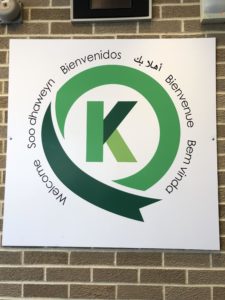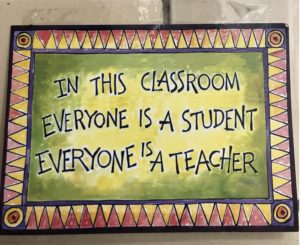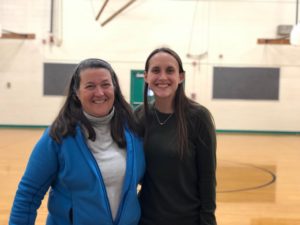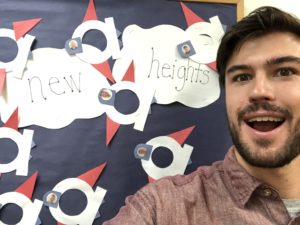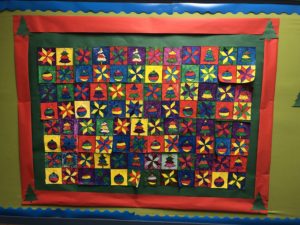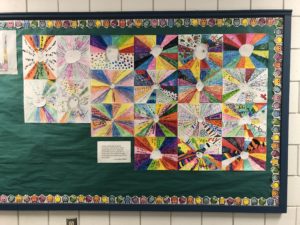King Middle School’s Educator in Residence: Sam
The Educator in Residence program, in my opinion, is one of the most rewarding parts of working for Kieve-Wavus Education. During the fall and spring seasons at The Leadership School, we have the pleasure of working with middle school students from across the state. Typical programs last up to five days; however, during the winter most educators are at their schools for ten weeks. This is incredibly valuable because it enables us to continue working with students and schools for a longer and more meaningful amount of time. Each educator plays a different role and wears many hats at their schools. But there is one constant: we all have the ability to positively affect middle school students from as far north as Searsport and as far south as Old Orchard.
Will, Noah and I have the unique privilege of piloting an EIR expansion this winter. Instead of being at our schools for ten weeks, we will be staying at our schools for five months! This is an incredible opportunity that will allow us to push ourselves as educators, schools to have an extra set of hands, and KW to give back even more to Maine middle school education. My personal hope is that the organization will be able to offer even more 5-month EIRs next winter and spring.
I am extremely thankful that I was placed at King Middle School my first winter at TLS. Over the past four winters, I have spent a collective 12 months working at King through the EIR program. Each year, I have been able to work with more and more students and expand what I can offer to the school. Over the course of the next five months, my goal is to teach social emotional learning to all 500 students. There are endless benefits from returning to your EIR school. I am working with the 6th graders for the first time this winter, 7th graders for the second time, and 8th graders for the third time. I also hope to offer climbing during crew and will be coaching track again this winter.
One of my favorite things about working at King is that it is one of the most diverse schools in the state, economically, racially and ethnically. King is also an Expeditionary Learning school, which works hand in hand with the social emotional work I provide in the classroom. I was able to hit the ground running on day one and look forward to packing in as much as possible over the next 5-months. I am so grateful to work with these students and be welcomed into their community. Being able to work with them throughout the entirety of their middle school careers is so rewarding and important. The students at King bring a smile to my face every day and I couldn’t think of a better place to call my winter home for five years now.
Hope Elementary School’s Educator in Residence: Dave
It’s an amazing feeling to be back at a school for a second year. Kids are excited to have me back, and teachers are excited too, though they express it a little differently—fewer high-fives and less yelling “Hi” to me in the hallway. This is my second winter at Hope Elementary School. And even though last year was only for 6 weeks, I felt so welcomed back, and familiar with the school that I was able to jump right in where I left off. I am a familiar face to the whole school community, and just as importantly, I am a known entity for teachers to let into their classrooms to do programming.
Hope Elementary is a PK-8 school, and I work with every grade for at least an hour. My overall goals for the groups conveniently align with the school goals: building a sense of community and self-confidence in students of every grade level. This week, I have worked with every grade except 2nd, and 7th though I do see them out at recess. With PK, K and 1st, I mostly focus on playing simple games that get the students moving, sharing about themselves, thinking about others, and that builds body awareness and control. These activities include very little processing, but usually have a few questions afterward so they can reflect a bit.
With 3rd-5th, the activities usually are a little more complex, but generally work towards developing the same things. The big change is my expectations for the kids and letting them know that I expect them to be more responsible for their actions. Also, my processing questions usually demand a bit more from them in terms of making connections and thinking critically, With the 5th graders, I start to include more conversations about what roles there are in a group, and how that played out in the activity.
By the middle school ages, I am much more hands off with directives about how I expect them to treat each other and act. I show them that they are responsible for their actions by leaving the conversation until after the activity so that they can reflect on how they might have affected other people, rather than getting reprimanded and merely feeling like they got in trouble. Besides looking into how actions affected others, I ask processing questions designed to get them thinking about how the activities relate to their relationships and actions in their everyday life.
My favorite thing about working at this school is the sheer number of age groups I get to work with. I get to meet and hang out with all kinds of different interesting It is fascinating to tinker with activities to meet the needs of the different age groups, and then to see how those groups respond to those activities.

